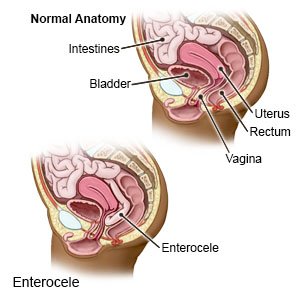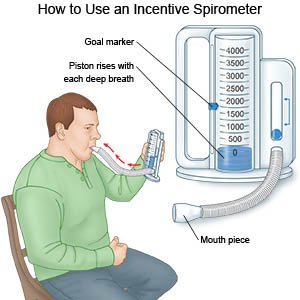Enterocele Repair
Medically reviewed by Drugs.com. Last updated on Apr 6, 2025.
Enterocele repair is surgery to stop part of your intestine from bulging into your vagina.
 |
DISCHARGE INSTRUCTIONS:
Call your local emergency number (911 in the US) if:
- You have sudden chest pain or trouble breathing.
- You cough up blood.
Seek care immediately if:
- You cannot urinate.
- You soak a sanitary pad with blood every hour for 4 hours.
- You have vaginal pain that does not go away even after you take pain medicine.
- You have pus or a foul-smelling discharge from your vagina.
- You see blood in your urine.
- Your leg feels warm, tender, and painful. It may look swollen and red.
Call your gynecologist or surgeon if:
- You feel something is bulging out into your vagina or rectum and not going back in.
- You have a fever, chills, a cough, or feel weak and achy.
- You have nausea and are vomiting.
- You have questions or concerns about your condition or care.
Medicines:
You may need any of the following:
- Antibiotics prevent or treat a bacterial infection.
- NSAIDs , such as ibuprofen, help decrease swelling, pain, and fever. NSAIDs can cause stomach bleeding or kidney problems in certain people. If you take blood thinner medicine, always ask your healthcare provider if NSAIDs are safe for you. Always read the medicine label and follow directions.
- Prescription pain medicine may be given. Ask your healthcare provider how to take this medicine safely. Some prescription pain medicines contain acetaminophen. Do not take other medicines that contain acetaminophen without talking to your healthcare provider. Too much acetaminophen may cause liver damage. Prescription pain medicine may cause constipation. Ask your healthcare provider how to prevent or treat constipation.
- Stool softeners help make it easier for you to have a bowel movement. Some of these medicines are available without a prescription. Your healthcare provider can recommend one that might be right for you.
- Take your medicine as directed. Contact your healthcare provider if you think your medicine is not helping or if you have side effects. Tell your provider if you are allergic to any medicine. Keep a list of the medicines, vitamins, and herbs you take. Include the amounts, and when and why you take them. Bring the list or the pill bottles to follow-up visits. Carry your medicine list with you in case of an emergency.
Self-care:
Your healthcare provider will give you specific instructions to follow. Your provider will tell you when it is okay to do certain activities. The following are general guidelines to follow in addition to instructions from your provider:
- Rest as much as possible. It is important to rest and give the surgery area time to heal. Ask when you can start doing your regular activities. This includes driving, doing housework or yard work, and going back to your job.
- Do not have sex or put anything in your vagina. The surgery area needs time to heal completely. Change your sanitary pad regularly. Keep track of how often you change the pad.
- Do not go swimming or sit in a hot tub or bath. This can lead to an infection.
- Do not lift anything heavier than 10 pounds for at least 6 weeks. Heavy lifting puts pressure on the surgery area and slows healing.
- Avoid heavy exercise. Your provider will give you an activity plan. You may need to start with light activity, such as short walks. This may be recommended 3 to 4 weeks after surgery. Your plan may increase activity as the surgery area heals.
- Do not strain when you have a bowel movement. The strain may damage the surgery area. Your bowel movements may not be regular again for a few weeks after surgery. Some pain medicines you might be taking can also cause constipation. The following can help prevent or relieve constipation:
- Drink extra liquids to help soften and move your bowels. Ask how much liquid to drink each day and which liquids are best for you.
- Eat high-fiber foods. Fiber helps move waste through your intestines. High-fiber foods include fruits, vegetables, whole-grain breads and cereals, and beans.

- Physical activity included in your activity plan will also help your bowels work better.
Care for the incision sites:
If you have abdominal incision sites, care for them as directed. Carefully wash around the sites with soap and water. It is okay to let the soap and water run over the incision sites. Do not scrub the sites. Dry the area and put on new, clean bandages as directed. Change your bandages when they get wet or dirty. If you have strips of medical tape, let them fall off on their own. It may take 7 to 14 days for them to fall off. Check your incision sites every day for redness, swelling, or pus.
Deep breathing:
Take deep breaths and cough 10 times each hour. This will decrease your risk for a lung infection. Take a deep breath and hold it for as long as you can. Let the air out and then cough strongly. Deep breaths help open your airway. You may be given an incentive spirometer to help you take deep breaths. Put the plastic piece in your mouth and take a slow, deep breath, then let the air out and cough. Repeat these steps 10 times every hour.
 |
Follow up with your gynecologist or surgeon as directed:
Write down your questions so you remember to ask them during your visits.
© Copyright Merative 2025 Information is for End User's use only and may not be sold, redistributed or otherwise used for commercial purposes.
The above information is an educational aid only. It is not intended as medical advice for individual conditions or treatments. Talk to your doctor, nurse or pharmacist before following any medical regimen to see if it is safe and effective for you.
Further information
Always consult your healthcare provider to ensure the information displayed on this page applies to your personal circumstances.
